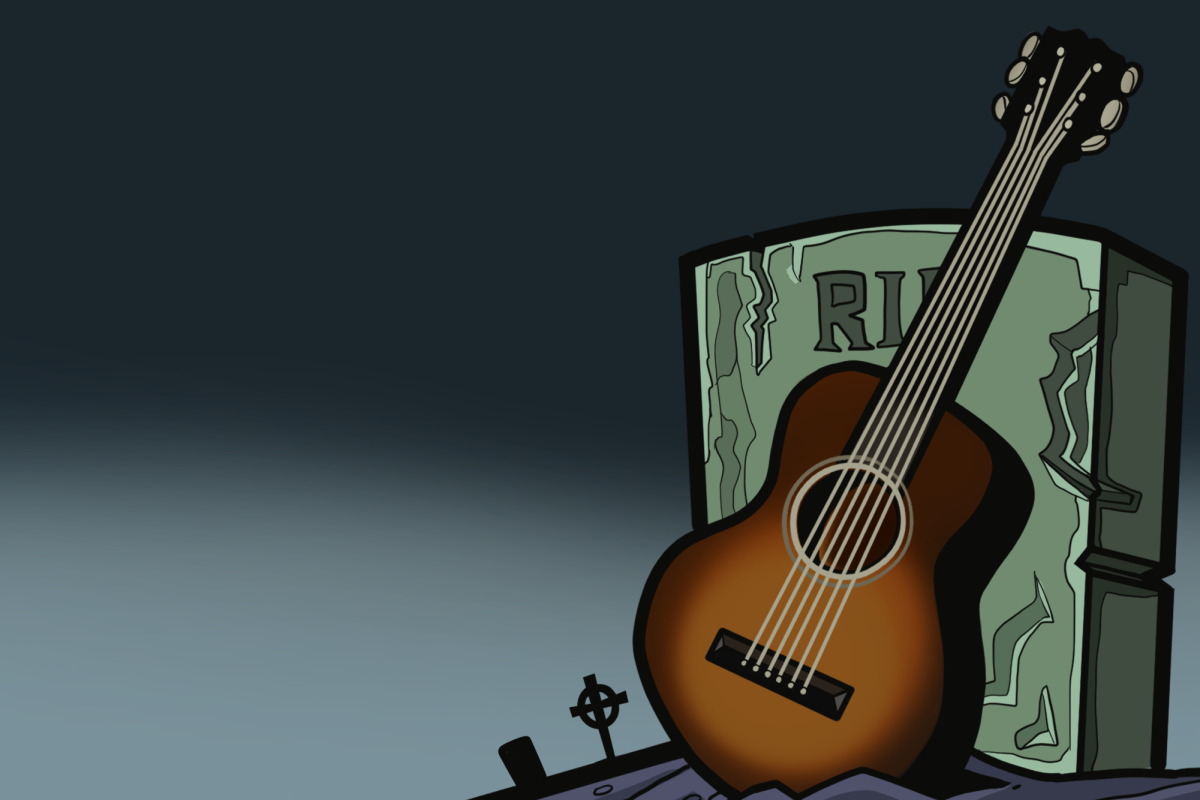Despite being reduced to the lesser half of R&B, the blues set the groundwork for much of the music that preceded it. The genre also has a rich history thanks to the cool cats who created it.
Howlin’ Wolf’s pain-stricken voice coupled with his 6-foot-6-inch stature captivated crowds. Muddy Waters’ swagger still fills an entire room when someone plays “Champagne and Reefer.” The most storied figure, however, must be the 27 Club’s inaugural member: Robert Johnson.
Charting at No.16 on Rolling Stone’s 2023 250 Greatest Guitarists of All Time list, Johnson is revered for his unearthly skills. Upon first hearing Johnson, The Rolling Stones’ Keith Richards asked, “Who’s the other guy playing with him?” mistaking his intricate strumming as the work of two. Despite his posthumous rise to fame, Johnson’s story is still shrouded in mystery.
So little is known for certain about him that even his recorded birthday, May 8, 1911, is just a historian’s best guess. Born in Mississippi, Johnson spent his adolescent years around Robinsonville, where blues legends Charlie Patton, Willie Brown and Son House resided. Johnson aspired to be a great musician and was a decent harmonica and jaw harp player, but his guitar was pitiful.
“He’d follow me and Willie around on Saturday night, … and every time we stopped to rest … [he’d] get the guitar and try to play it and just be annoying the people,” House said in an interview from the 1997 documentary, “Can’t You Hear the Wind Howl?” “And the folks would come out and say, ‘Why don’t some of y’all go in there and make that boy put that thing down? He’s running us crazy!’ ”
Around 1929, after his wife died during childbirth, Johnson left for “Arkansas, someplace,” according to House
“He was gone about six, eight months” House said. “When he come back, me and Willie Brown was playin’ out there and he walked in. He said, ‘Can I hit a lick or two?’ I said, ‘Now, don’t come back with that, Robert! You know the people don’t wanna hear that racket.’ He said, ‘Let them say what they want, I want you to see what I learnt.’ ”
When Johnson returned, he had seemingly mastered multiple styles of playing, including slide guitar and “chicken picking,” a percussive technique where the strings are plucked away from the guitar so that they snap back onto the fretboard. His expertise can be heard on songs such as “Cross Road Blues,” in which Johnson plays upbeat rhythmic guitar while chucking underneath, eliminating the need for another player.
But how he attained his skill is still heavily debated almost 100 years later. Some people, such as Bruce Conforth or Paul Merry, believe that while he was away Johnson learned from Isaiah “Ike” Zimmerman.
Zimmerman was a blues guitarist rumored to have supernaturally gained his talent by practicing in graveyards. Supposedly, he taught Johnson everything he knew and even brought him along to some of his macabre rehearsals. After about a year of this, Johnson was a pro. This is perhaps the more reasonable explanation for his mastery, but it’s not the story that cemented Johnson as a legend.
As the myth goes, Johnson went to the crossroads near Dockery Plantation one night with his guitar and met a tall, black figure. The specter took Johnson’s guitar, tuned it and played a bit before handing it back to him, completing the deal. Johnson had become an incredible guitar player, but at the cost of his soul.
From then on, the newly-gifted guitarist went from town to town as a “walking musician” who lived on the road and stayed with whoever he knew. For Johnson, it was usually either a woman that he’d been with in town before or one that he’d freshly seduced, regardless of their marital status. He traveled city to city from Texas to New York playing in juke joints and outside for tips. Johnson secured a recording session in 1936 in San Antonio and was invited back to Dallas the next summer after his record’s success.
He recorded 29 songs over five days, with several alternate takes as well. Producer Don Law said, that in the makeshift hotel room studio in San Antonio, Johnson sat in the corner and faced the wall while recording. It’s debated whether Johnson did this intentionally to improve the sound of his instrument or if he was just a shy player.
About a year after his second recording session, Johnson died on stage near Greenwood, MI, on Aug. 16, 1938. Just as with his birth and the origin of his ability, the circumstances of his death aren’t certain.
Many believe that Johnson was murdered by a jealous husband with a poisoned bottle of whiskey. However, a note on the back of his death certificate suggests that syphilis was the cause of death. Others say they saw him on the night of his death in the crossroads, howling up at the sky. No matter how he met his demise, Johnson’s fame outlived him.
John Hammond, who had praised Johnson in a 1937 review, set out in December a year later to recruit him for a concert he was putting together at Carnegie Hall, unaware of Johnson’s death a few months prior. Someone else took his spot, but Hammond played two of Johnson’s songs that night in his honor. Twenty years later, Hammond would also lead the production of the first compilation of Johnson’s work, “King of the Delta Blues Singers,” which undoubtedly helped spread his name.
Though attention is often directed at his guitar, Johnson was an impressive vocalist as well; his voice had a tinny quality that set him apart from other vocalists of his time. “Sweet Home Chicago” showcases his whiny singing and his vocal range as he drops to a low, melancholic tone when referring to the windy city and draws out the words “crying baby,” savoring every syllable.
Few musicians have had as much influence on their craft as Johnson. His playing has inspired many of the best guitarists to grace the stage, namely Eric Clapton, Bob Dylan and Jimmy Page. But more than that, his legend keeps interest in the blues alive and adds to the colorful collage of the storied genre.









